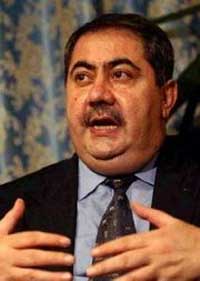Iraq FM urges patience with rebuilding
A premature pullout of the U.S.-led multinational security force could send Iraq and region spiraling into chaos, the countries foreign minister said, adding that a U.S. Senate proposal to divide the country into three regions was a bad idea.

Iraqi Minister of Foreign Affairs Hoshyar Zebari also said Monday that despite the strife roiling his country, he remains optimistic - even as he said Iraq should not be dragged in to any brewing conflict between the United States and Iran.
"The task facing us is challenging, but I'm confident about the future of my country," Zebari said during a speech at Harvard University's John F. Kennedy School of Government. "No matter how close we came to the brink, the Iraqi people have risen to the occasion."
Crucial to helping the country maintain a path toward democracy and stability is the 160,000-strong U.S.-led multinational force, Zebari said, even as support for the war is waning among U.S. voters.
A rapid withdrawal could lead to the collapse of the government, and allow terrorist groups like al-Qaida in Iraq to set up permanent shop within the country, he said.
"If we fail we might have a country torn apart by civil strife," he said. "Terrorists will have safe havens that they will turn into death triangles."
Although he said a multinational force should remain, Zebari said Iraq would eventually like to negotiate a long term bilateral security agreement with the United States similar to other agreements the U.S. has with Saudi Arabia, Kuwait, Egypt and other countries.
The speech comes ahead of a planned meeting in Istanbul, Turkey, in early November between Iraq and its neighbors where Iraqi officials will press for help in three key areas: security, refugees and energy.
Secretary of State Condoleezza Rice and representatives of Iran, Russia, France, Italy, Egypt and Saudi Arabia are expected to attend the meeting, which Zebari said is another important step in gaining international recognition for the government.
"Iraq is now fully engaged internationally," he said. "Look at what we are aspiring to - a free country, a united federal democracy at peace with its neighbors and with itself. We are not there yet."
The high-level meeting is seen as a follow-up to a May meeting in Sharm el-Sheik, Egypt that produced the International Compact with Iraq, a sweeping five-year economic and political reform package that the U.N. secretary-general helped broker.
Zebari's visit also comes on the heels of U.S. Senate proposal calling for a limited centralized Iraqi government with the bulk of the power given to the country's ethnically divided regions.
The proposal has met with harsh criticism from representatives of Iraq's major political parties and the U.S. embassy in the country. Iraqi officials have described it as an affront to their sovereignty and said it is a recipe for divisiveness and further stoking the ethnic and sectarian rifts that have undermined Iraq's efforts at stability.
The nonbinding resolution adopted by the Senate calls for Iraq to be divided into federal regions under the control of Kurds, Shiites and Sunnis in a power-sharing agreement similar to the one that ended the 1990s war in Bosnia.
"That is not a solution. There is no magical solution," said Zebari, a Kurd. "This decision should be left for the Iraqi people."
Zebari also urged Iraq's neighbors not to meddle in the country's affairs, especially giving support to insurgents or other destabilizing forces.
But he acknowledged that Iraq has no other option but to learn to live with other countries in the region, despite tensions and disagreements - including Iran.
"We and Iran are two neighbors and are destined by geography and history to live together," he said. "We need to forge good neighborly relations based on mutual respect."
Zebari also said that with all the challenges facing his country, the last thing it needs is to be dragged into a conflict between Iran and the United States.
"The message we have been sending out to both (countries) is to keep their differences away from Iraq because we have too much on our plate," he said.
Subscribe to Pravda.Ru Telegram channel, Facebook, RSS!


